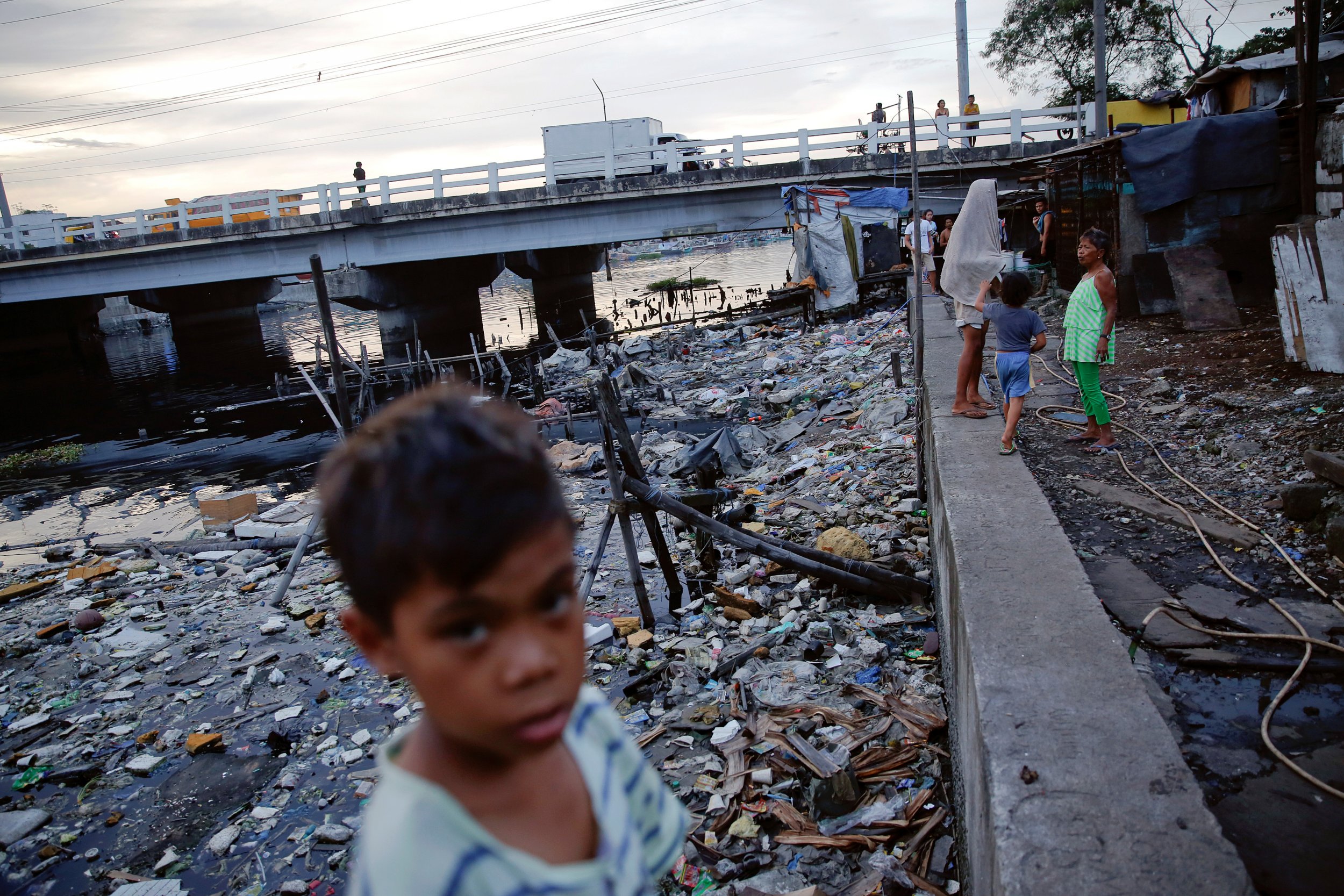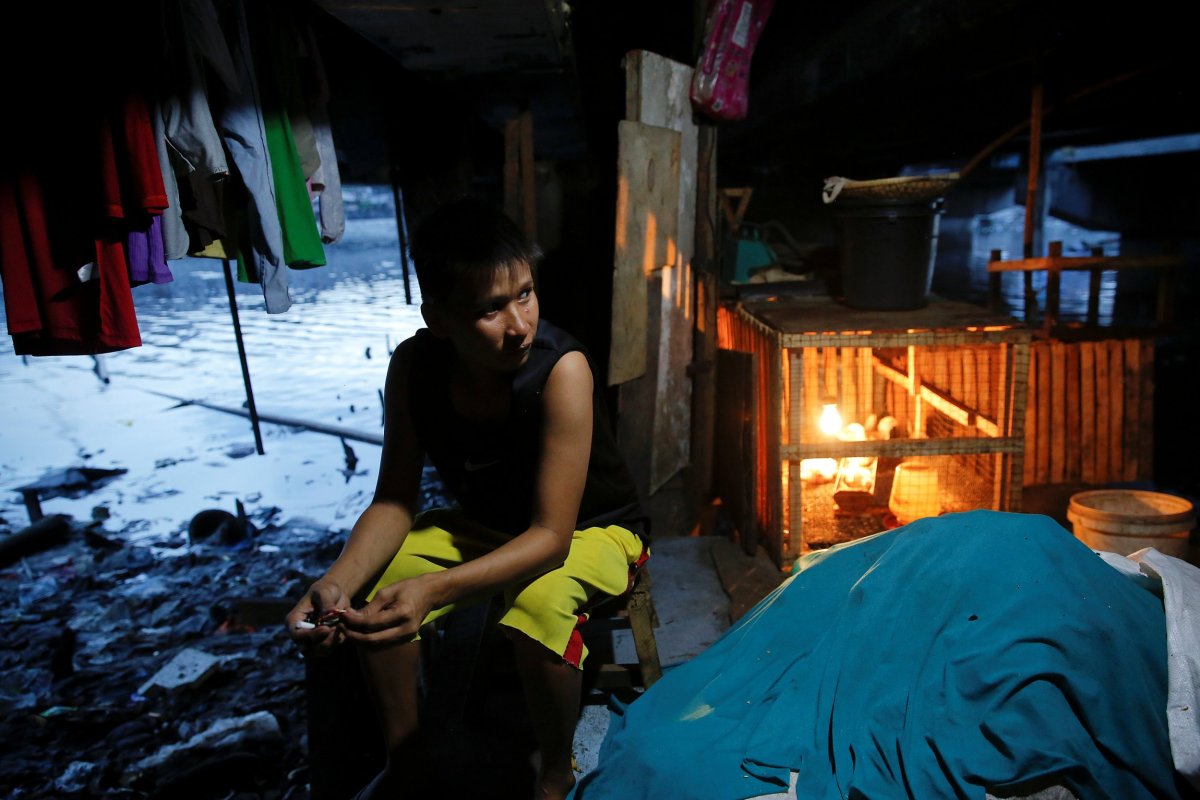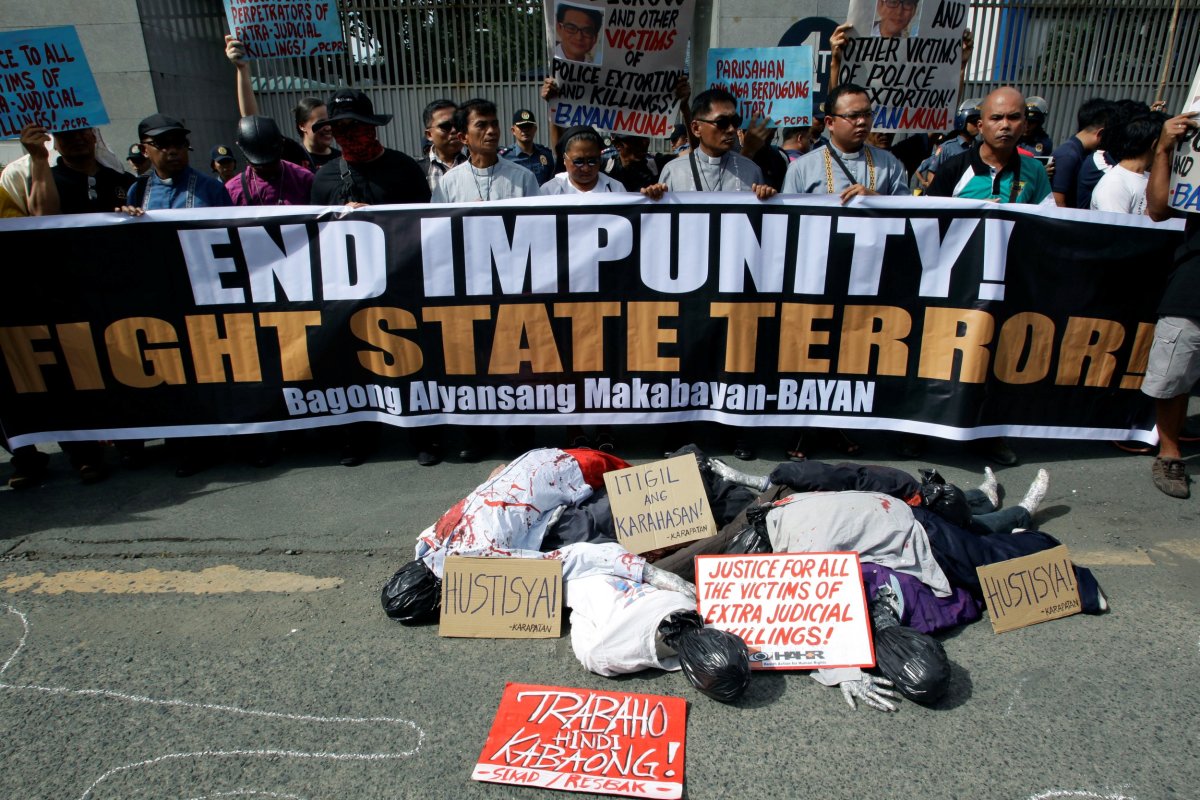
By age 12, Ryan had already sold crack cocaine, begged, and stolen from shops. He had been to prison five times, and was brutally tortured by police to find out where he had hidden a necklace. "The police made me kneel on a rough floor all night and beat my legs with the batuta stick. They had no mercy, even though I begged in pain," Ryan said. After that, he was given only a biscuit for dinner, and sent back to his jail cell, he told Unicef workers.
The Philippines had its third and final reading this week of a bill to bring back the death penalty—one of President Duterte's main election campaign promises. If the bill is passed, the Philipines would be the first country in Southeast Asia to abolish and then reinstate capital punishment. Compounding this is the likely lowering of the age of criminal responsibility to nine, which would make it one of the only nations in the world to hold children under ten to account.
If the death penalty is passed, and the age of criminal responsibility is reduced, it's possible that children like Ryan, forced onto the streets to provide for their large families, could face execution.
"Lowering the age of criminal responsibility from 15 to 9 is a death sentence to our children," Senator Risa Hontiveros, who is opposing the bill, said in a national press conference in February. By treating children in conflict with the law as hardened criminals, they could either end up dead in the hands of extrajudicial killers or the state."
The third reading of the bill yesterday in the lower house was largely symbolic, as it has already passed in the Lower Chamber with 217 votes in favor, and just 54 against. Finally, it will go to the Senate, which is also sympathetic to Duterte. The president must then sign off on the bill, and the death penalty will be in force.
"The Senate is now the Philippines' last real hope of upholding its international obligations and rescuing the country from this backwards step," said Champa Patel, Amnesty International's director for southeast Asia and the Pacific.
The Philippines abolished the death penalty in 2006, amid overwhelming support from legislators. The then president Gloria Arroyo, signed the law to end the punishment just before she visited the Vatican to meet the Pope. "We yield to the high moral imperative dictated by God to walk away from capital punishment," Arroyo said in a speech.
Twelve years later, and the current government is committed to reinstating the penalty. House speaker, Pantaleon Alvarez, who filed the bill, put pressure on House leaders to pass it, and threatened their jobs if they abstained or failed to attend. He also proposed the bill to lower the age of criminal responsibility to nine from 15 in July 2016: "Adult criminals knowingly and purposely make use of youth below 15 years of age to commit crimes, such as drug trafficking," he said in an explanatory note.
Since Duterte became president, over 7000 people have been killed extrajudicially as part of his war on drugs. Thousands of Catholic Filipinos marched against Duterte's war on drugs on February 18 as a protest against the growing "culture of violence."

"We have to stand up. I am alarmed and angry at what's happening because this is something that is regressive. It does not show our humanity." Broderick Pabillo, a Manila-based bishop told AFP news agency before addressing the crowd. Around 80 percent of the Philippines' population are Catholic, and the Church helped to topple Ferdinand Marcos in 1986.
Known for his belligerent speaking style—Duterte once described Obama as "son of a whore"—the Filipino president told supporters on his campaign trail that he wanted to bring the death penalty back so he could hang people rather than shoot them, thereby saving bullets. In a news conference in September 2016, he said other presidents had succumbed to Catholics and "other bleeding hearts " who argued capital punishment was a crime because "only God can kill."
"The problem with that is, I ask you, what if there is no God? " Duterte said, speaking to reporters in September at the presidential palace in Manila. "When a one-year-old, an 18-month-old baby is taken from the mother's arms, brought under a Jeep and raped, and killed, where is God?"
"People in the Philippines no longer believe in the laws, because the fear is not there," the president added.
Amnesty International has condemned the bill as "inhumane, unlawful, and an ineffective response to drugs." If the Philippines' authorities want to deal with the root causes of drug-related offences, they "should support humane, voluntary, health-focused and evidence-based policies as an alternative," Patel said.
As opposition leaders in the Philippines are keen to point out, there is no statistical evidence that the death penalty prevents crime. Senator Hontiveros cites evidence that Hong Kong and Singapore have identical murder rates despite the former abolishing the death penalty in 1993.
"On the government's plan to lower the age of criminal responsibility from 15 to 9, I believe it would be a death sentence to our children," Hontiveros says. "By treating children in conflict with the law (CICL) as hardened criminals, our kids could either end up dead in the hands of extrajudicial killers or of the state.
"They could become targets of vigilante death squads, which have already killed thousands of Filipinos or land on death row if a lowered age of criminal liability is combined with the death penalty law."
The proposed changes will also hurt the most vulnerable in society, Hontiveros claims: "The sad reality is that our justice system is still susceptible to the influence of the moneyed and influential.
"Should the death penalty find its way back, we can expect abuse and wrong convictions to lead to the deaths of many poor, innocent people. We cannot bring the dead back to life, the death penalty is an irreversible and irreparable punishment."
Lotta Sylwanda, the UNICEF representative for the Philippines, is also deeply concerned by lowering the age of criminal responsibility. "We fought to raise [it] from nine to fifteen, and now it is threatened again. At present, children under 15 who are caught [committing a crime] go through a restorative justice procedure, and never enter the criminal justice system."
The death penalty will be used to punish theft, piracy, infanticide, rape, murder, keeping drug dens and destructive arson along with many other crimes. Children, Sylwanda argues, are less likely to be killed because they account for so few of the serious crimes. "Just 1.7 percent of all crimes are committed by children, so to me, it's surprising they don't look into laws that break down syndicates and organized crime that employ the children in the first place," she adds.

Supporters of the death penatly know little about how child offenders are dealt with in the Philippines, Sylwanda adds. "They think the situation is too lenient, and that they're just being released without punishment. This isn't the case."
There are already facilities in place for child criminals: Bahay Pag-asa are youth centers, open 24 hours a day, to provide short-term residential care for 12-18 year olds who are either repeat offenders or are awaiting court disposition, or who have been abused or neglected.
Conditions vary in the so-called rehabilitation centers. The Manila Times reported that senior Philippine officials made spot-checks on children in January 2016 and found a "house of horrors" with overcrowded cells, where the children suffered in "24-hour confinement with no sun exposure." The floors and walls were dirty, and the children were completely barefoot. Several children had mental health issues and needed special care but there were no programs for emotional healing, therapy, education or mental stimulation.
There are also concerns that simply lowering the age of criminal responsibility will deter criminal gangs from using children. "I do not agree with the justification behind the move to lower the age of criminal liability," Hontiveros says. "[Some of my colleagues] subscribe to the simplistic logic that assumes crime rates will go down if you put more children in jail. I think that this is where the point goes astray.
"Most children who commit crimes are acting on behalf of syndicates and adult criminals. Thus, it is the adult criminals and not the children who should be held primarily responsible. By lowering the age of criminal responsibility, the government ignores the uneven power relation between the adult criminal and CICL and even passes the blame for the crimes of adults to the children," says Hontiveros.
Children are low-hanging fruit for the Philippines' police, Hontiveros says. "[The lowering of the age of criminality] highlights the failure of our police to apprehend the really dangerous criminals and big-time syndicates. Unable to crack down on the crime syndicates and pressured to produce results in the government's abuse-prone anti-crime campaign, children are easy targets."
If the Senate passes the bill, the death penalty could be reintroduced as soon as April 1. Duterte has promised to execute "fix or six" criminals a day. Amnesty International has already said the extrajudicial executions of criminals as part of the president's war on drugs may amount to crimes against humanity. If the death penalty is legalized, Duterte's administration can claim that killing alleged criminals is the official punishment, decided democratically by Congress. But Carlos Conde, the Philippines researcher for Human Rights Watch, believes this could present greater dangers: "Adding a veneer of legality to the bloodbath in the Philippines will make stopping it even harder."
Uncommon Knowledge
Newsweek is committed to challenging conventional wisdom and finding connections in the search for common ground.
Newsweek is committed to challenging conventional wisdom and finding connections in the search for common ground.
About the writer
To read how Newsweek uses AI as a newsroom tool, Click here.








